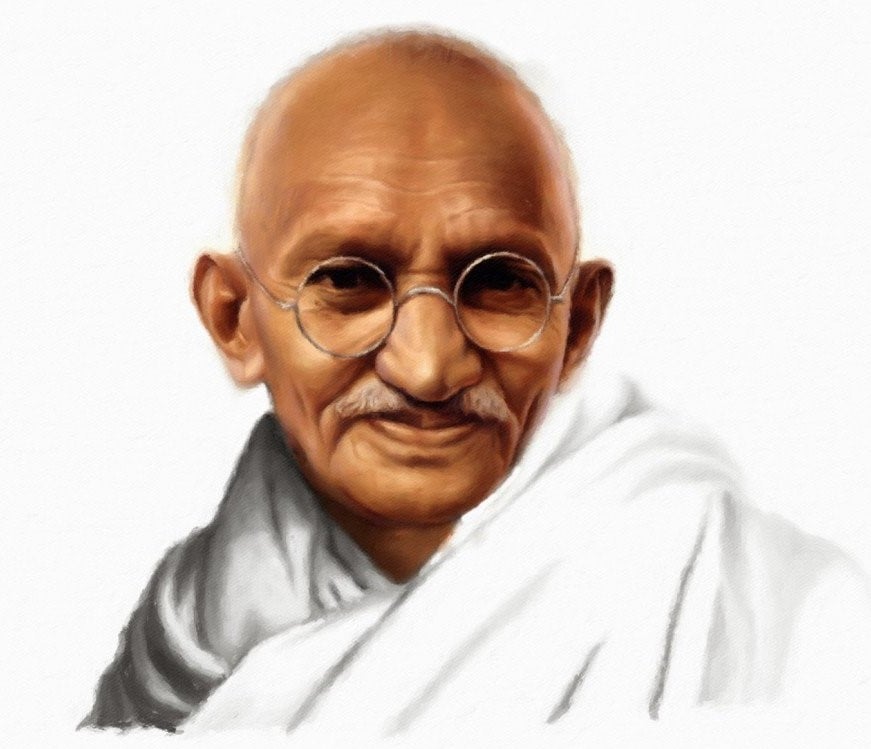Scroll down for printables.

Early life
Mohandas Karamchand Gandhi was born to a Hindu family on October 2, 1869, in India. He was a lawyer, politician, social activist and writer who became the leader of the nationalist movement against the British rule of India. Today he is best known for being a symbol of peace, humility and willful poverty.
At thirteen Gandhi was married to a girl who was the same age as he. He traveled to London in 1888 to study law and graduated in 1891. After attempting but failing to practice law in Bombay, India, Gandhi accepted a job offer in South Africa. He spent more than two decades there. This is also where he found his true passion for advocating civil rights.
Gandhi in South Africa
In South Africa, where the Indian population mainly worked as poor laborers, Gandhi experienced the oppression and racism in this country at first hand. He was thrown off a train, barred from hotels reserved “for whites only,” and assaulted by a white mob. Like his fellow Indians, he was not even allowed to walk on the pavement!
In 1894 Gandhi tried — but failed — to oppose a bill in court which would deny Indians the right to vote. During the Second Boer War he organized a party of 1,100+ volunteers to carry wounded soldiers for miles to receive medical care. He was awarded the Queen’s South Africa medal for this act.
The British victory in the war brought little relief to the Indians in South Africa. A law was passed making it compulsory for Indians over eight years of age to carry a pass bearing a thumbprint. This caused outrage among the Indian population, who refused to register and, under Gandhi’s leadership, decided to resist passively. The struggle lasted seven years, during which time Gandhi himself and thousands of other Indians went to jail. Some were beaten and even shot.
Returning to India
On July 18, 1914, Gandhi returned to India and led his country to full independence after 30 years of opposition to British rule – without violence. Their non-violence policy, however, led to the Jallianwala Bagh massacre in 1919. British troops opened fire on a crowd of peaceful protesters, killing nearly 400 Indians and wounding over 1,200.
After years of peaceful protesting, meetings with world leaders, and hunger strikes by Gandhi, Britain finally granted India independence. In 1948, at the age of 79, Gandhi was assassinated by Nathuram Godse, a young Hindu fanatic.
Accolades
Gandhi received numerous accolades including:
- Rabindranath Tagore, a great Indian polymath, gave him the title of “Mahatma,” meaning “great soul” in Sanskrit.
- Time magazine named him ‘Man of the Year’ in 1930.
- He was nominated for the Nobel Peace Prize five times between 1937 and 1948 though he was never awarded the prize. The Nobel Committee publicly declared its regret for the omission decades later.
- In Johannesburg, South Africa, a statue of him was erected in the Gandhi square in October 2003.
.
.
Questions:
- Where was Gandhi born?
- Gandhi had a range of professions – can you name 4 of them?
- Do you know what humility means?
- Can you find the antonym for indifference in the passage?
- Do you know how long two decades are?
- Can you name three of the hardships Gandhi experienced while in South Africa?
- What was the name of the medal he was eventually awarded?
- Gandhi tried — but failed — to oppose a bill in court that would deny Indians the right to vote. In what year did this happen?
- Can you find the synonym for persecution in the passage?
- Do you know what the word mob means?
- In what year did Gandhi return to India?
- In what year was the Jallianwala Bagh massacre?
- Do you know what the word passively means?
- Can you find the antonym for hostile in the passage?
- At what age did Gandhi pass away?
- What was the cause of Gandhi’s death?
- Name two of Gandhi’s accolades.
- What does Mahatma mean?
- What is Sanskrit?
- Do you know what polymath means?
- Can you find the synonym for autonomy in the passage?
.
Answers:
- India
- Lawyer, politician, social activist and writer.
- The quality or state of being humble – not thinking you are above others.
- Passion
- Decade = period of ten years. Two decades are 20 years.
- He was thrown off a train, barred from hotels reserved for whites and assaulted by a white mob.
- The Queen’s South Africa medal
- 1894
- Oppression
- A large group or crowd of people who are angry/violent or difficult to control.
- 1914
- 1919
- Allowing things to happen, without active response or resistance.
- Peaceful
- 79
- He was assassinated by a young Hindu fanatic.
- He received the title of Mahatma; Time magazine’s man of the year 1930; he was nominated several times for the Nobel Peace prize; a statue of Gandhi was erected in Johannesburg.
- “Great soul”
- An ancient language of India.
- Someone who knows a lot about many different things.
- Independence
.
.
Printables:
Comprehension worksheet – passage only
Comprehension worksheet – questions and answers only
Comprehension worksheet with questions and answers per paragraph
.
Edublox offers cognitive training and live online tutoring to students with dyslexia, dysgraphia, dyscalculia, and other learning disabilities. Our students are in the United States, Canada, Australia, and elsewhere. Book a free consultation to discuss your child’s learning needs.

